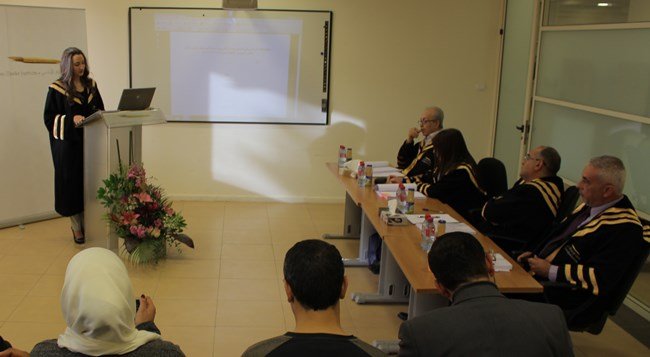Image:

01 Dec 2017
1 Dec. 2017 <br />
<br />
Amman- An MA thesis debated at the Jordan Media Institute (JMI) has concluded that news reports on the Syrian and Yemeni crises on Al Jazeera TV and BBC Arabic focused on violence by more than 80% and that physical violence exceeded 98% of the content of violence.<br />
<br />
The study, submitted by Lana Kazkaz to earn the MA degree, was titled "Coverage of Political Violence in Syrian, Yemeni Crises: Study of Content Analysis of News of Al Jazeera and BBC Arabic 2011-2016." It aimed at exploring the features of the coverage of political violence in the Yemeni and Syrian crises by Al Jazeera news channel and BBC Arabic through analyzing the content of 120 news reports that covered a number of events between 2011 and 2016.<br />
<br />
The study, which was supervised by JMI Dean Professor Basim Tweissi, concluded that the two channels went beyond providing information within the context of news and the values and beliefs linked to it to the creation of a new physical circle linked to sensationalism and violence. Thus, the news framework shifted from straightforward reporting of events to drawing a mental image, as if this were Syria or Yemen. In the Yemeni crisis, Al Jazeera was interested in covering news of the Arab coalition forces, while BBC Arabic showed interest in news of the Houthis and the Saleh forces.<br />
<br />
The two channels linked each crisis to key actors. In the Syrian crisis, Al Jazeera TV focused on the Syrian army more than BBC Arabic. Al Jazeera TV considered the party responsible for the violence to be the Syrian army, while the BBC coverage showed that responsibility was divided equally between the Syrian army and the Free Army, according to the study.<br />
<br />
The study was conducted in an environment rife with wars, infighting, and regional and international interventions, along with growth in the television industry and increasing media and political competition among regional news channels. Arabic-speaking international channels have joined the competition. Violence and war in the region have escalated, besides the rise in the phenomenon of citizen journalism.<br />
The debate committee comprised Dr. Amani Jarrar, Dr. Jean Karam, and Dr. Sakher Khasawneh.



